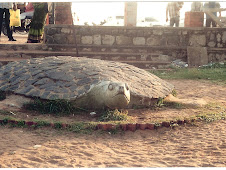The tea gardens reaching up to Nallamudi, in Valparai, are owned by the Bombay Burmah Trading Company, but where the hill falls off into the Pooncholai, the Forest Department of the state government takes over. The tea gardens are scenic enough, but the shola forests of the pooncholai make them quite run-of-the-mill in comparison.
To get to the pooncholai, we have to buy tickets from the forest guard. It is then that we learn of a unique gent who is allowed unhindered access into the forests. "He has seen God, you know", says our driver and he is backed up by the forest guard. Yeah, right.
The climb up through the tea garden is a slow gradient. The sight of a black shouldered kite on a silver oak keeps us company through a curve. The flower of the tea plant - now, whoever thought they would be allowed to blossom? - with a bug lying on its back inside the petals kept conversation going for a while.
Then, silence. A dragonfly, with a deft mid-air swerve, swooped on a small Blue Tiger butterfly with a softly audible 'thwack'. It is surely not polite to watch someone eat, but we try to take pictures. The dragonfly is not amused and it goes deeper into the tea gardens.
We are near the edge. A ledge, with a concrete structure, comes into view. An old man close to the building sees us coming and calls out, urging us to come on over. We watch. He goes to the edge, raises his arms to the sky and yells across the valley. Not a language that any of us can decipher.
We follow his arms as they come down, to look across the valley. In the far distance, seven or eight threads of silver seem to be descending directly from the clouds that wrap the peaks. The threads are lost in the multi-coloured greens of the sholas, and, much lower down, emerge as broad streams making waterfalls as they course further down the valley.
A path dips away to the right, and at its end, a small clearing houses two large, flat, sloping stones, which, together with a third, smaller one, form a rough triangle. An open flame on the small stone is almost invisible in the bright sunlight. The larger stones are decked out with flowers in bright colours, some of them way off any palette that you can imagine.
Along the path, many of those flowers bob at us. Amidst them, more bright colours flash around; flying jewels, those Crimson-backed Sunbirds. One would think such brilliantly coloured feathers would stand out, but they merge with the vivid flowers until we are confused if it is the flower or the bird that is flying.
Heaven on earth.
And then we see the signboard on the side of the path. In Tamizh and English, it says this is the 'SEEN GOD SHRINE'. The old man is waiting, he has seen us looking at the sign. "38 years and 104 days ago", he says. "I saw God. Here". He speaks in Tamizh and English and says his life changed that day. No more trousers, no job, just tending to the stones for a couple of hours a day before going to his son's house for his daily 'kanji'.
Velu has seen all the animals of the forest. He is believable, for he does not tell of the tiger we missed last week. The last one he saw was five years ago. We ask him about the God. "There was a square patch of brilliant light, and it grew to a column that seemed to reach up to the sky. He was beautiful. I saw him with these mortal eyes.", he says, emphasising the mortal-ness.
We probe further. What did he speak to God about? "Why would I need to tell you about that? I saw Him, I spoke to Him and I am the better for it". So, is he a devotee? "பித்தன்னு சொல்லலாங்கொ (a manic would be more apt)". He is happy. Maybe he did have some kind of epiphany here.
There are few better places to have a vision of God, anyway.






